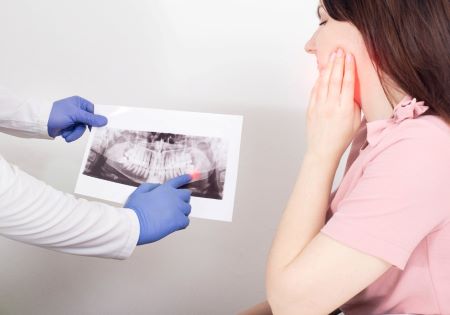All About Wisdom Teeth Pain: Relieving Symptoms & Spotting Signs of Infection

It’s probably been years since you’ve experienced toothache pain from getting your permanent teeth. However, that pain may return because of your wisdom teeth. These third molars can put pressure on your gums when they come in or develop infection from impaction when they have difficulty erupting through the gums, which can cause quite a bit of discomfort.
We’re going to talk about relieving wisdom tooth pain, including tips for recovery after getting them removed. We’ll also discuss home remedies for wisdom teeth pain and why you actually may not need to get your wisdom teeth removed.
What are Wisdom Teeth?
Wisdom teeth are the third molars that come through at the back of your mouth. They are the final adult teeth to come in and generally emerge in the late teens or early twenties, finishing your set of permanent teeth.
In humans’ evolutionary past, wisdom teeth were vital to grind and consume hard foods, like nuts and tough meats. In modern times, however, these third molars have little to no function, and wisdom teeth can become a problem if they affect the gums and cause pain, infection, or other dental problems.
Toothache pain can be mild or fleeting. It can also turn severe and more persistent. If your tooth pain will not go away, you should check in with your dentist.
When Do Wisdom Teeth Come In?
Most people see their wisdom teeth come in between the ages of 17 and 25. That’s about a decade or more after your first permanent teeth begin to grow. That can be a wide range and soreness from teeth developing in the gums can start long before teeth begin to erupt. Wisdom teeth coming in just underscores the importance of getting proper dental care throughout adolescence and early adulthood.
Granted, it may be harder to keep tabs on your child’s dental health or make time for an appointment when they leave home or go off to college. Still, they should do their best to brush and floss regularly and check in with their dentist to help avoid potential infection and limit the potential for wisdom tooth pain.
Does Everyone Have Wisdom Teeth?
Not everyone has wisdom teeth either because they never developed or, more likely, from getting them removed. While research has shown that 53 percent of the world’s population has at least one third molar, it’s somewhat common to have less than four as our bodies adapt evolutionarily to not needing these extra molars to grind hard foods. In fact, some people never develop wisdom teeth at all!
How Do You Know if You are Developing Wisdom Teeth?
You may experience some of the following symptoms when your wisdom teeth start to emerge. These could include:
- Redness or swelling in the gums
- Jaw pain or tenderness
- Facial pain stemming from nerve pressure
- Small, white spots emerging behind your second molars in the back of your mouth
If you have children, it will have been years since they experienced teething pain.So, should they start to experience some similar symptoms, it’s possible their wisdom teeth are starting to break through the gums and causing toothache pain.
A check-in with your dentist or orthodontist can help you find concrete answers. They’ll typically take X-Rays that can verify if the third molars are erupting and track their development from that point on.
What Are Some Types of Wisdom Tooth Pain?
You may experience wisdom tooth pain for different reasons. Most common among these are:
- Soreness as wisdom teeth develop under the gums and prepare to emerge.
- Pain from an infected wisdom tooth—see your dentist for recommendations on how to deal with this issue.
- Pain from cavity in wisdom tooth or teeth.
- Tooth sensitivity due to crowding or hitting other teeth when you chew.
If you are dealing with general soreness, you may look to relieve wisdom tooth pain with an at-home remedy. Otherwise, consult with a health professional to determine whether you need to get your wisdom teeth removed.
Tips for Relieving Wisdom Tooth Pain
Achy jawlines and teeth can prove quite frustrating. But how do you help relieve wisdom tooth pain? If you’re feeling discomfort because they are just starting to break through the gums, follow these tips for wisdom tooth pain relief.
Eat Soft and Cold Foods
Pain in your third molar can make it difficult to open your mouth and cause sensitivity when chewing. As such, it’s a good idea to work in softer and colder foods, like yogurt, applesauce and ice cream. Be sure to drink plenty of liquids as well.
Take Some Ibuprofen
As an anti-inflammatory, ibuprofen can help relieve wisdom tooth pain before and after removal. If you’ve undergone a procedure to get your wisdom teeth removed, your dentist may prescribe a specific amount to take after extraction. Stop using ibuprofen and speak with a doctor if you continue to experience pain.
Use a Toothache Gel
If your gums are sore from wisdom teeth coming in or your third molars are tender, try a toothache cream or gel to help relieve gum and tooth pain from wisdom teeth. Orajel™ 4X Medicated For Toothache & Gum Cream provides instant pain relief* for severe toothaches and painful gums. It also helps prevent infection and kills harmful bacteria. Orajel™ PM 4X Medicated For Toothache & Gum Cream offers similar relief powered by four active ingredients for fast topical pain relief*, plus chamomile.
Both products have a Ready-Open Tube Tip for easy access. If you prefer a gel to a cream, try Orajel™ 4X Medicated For Toothache Gel, which delivers targeted and long-lasting pain relief*.
*Up to 2 hours relief
Try a Mouth Rinse
Using a mouthwash or rinse may help soothe toothaches and gums. If you’re looking to relieve wisdom tooth pain and have yet to determine whether you need to have them removed, try Orajel™ Toothache Rinse. It’s the only double medicated rinse for the temporary relief of pain due to toothaches and minor irritation of the mouth and gums, or occasional minor irritation, pain, sore mouth and sore throat.
Note that you should only use an over-the-counter rinse or mouthwash before undergoing any procedures to have your wisdom teeth removed. If you’ve already undergone surgery, stick to any rinses your dentist may have prescribed for you. Alternatively, you might try rinsing with warm salt water, but do not start rinsing until the day after your procedure.

Keep Brushing Those Teeth!
You want to ensure you are brushing your teeth when your wisdom teeth are coming in. Additionally, if you’ve gotten your wisdom teeth removed, you should resume brushing teeth (gently) 24 hours after extraction, as directed by your doctor.
Given that your third molars are all the way back in your mouth, some people struggle to brush them properly. That can lead to plaque build-up and infection. It’s a good reminder to brush those teeth properly, even when you’re feeling wisdom teeth pain. Doing so may help prevent toothaches, decay or infection in the future.
Do You Need to Get Your Wisdom Teeth Removed?
You do not necessarily need to get your wisdom teeth removed. A dentist is likely to recommend surgery to remove one or more wisdom teeth if there are signs of impaction, infection, or decay, or if your molars have too much crowding.
Some wisdom teeth may need to be removed if they are trapped beneath the gums. This can cause infection and damage other teeth roots or bone support. Others that emerge partially through the gums can be hard to see and clean and thus attract bacteria, which may result in infection. Your dentist may also advise that you have full-grown wisdom teeth pulled if they create crowding in your mouth and damage nearby teeth.
How Do You Know if Your Wisdom Teeth Need to be Removed?
You may need to get your wisdom tooth removed if it becomes impacted. If a wisdom tooth is impacted, it is stuck below the surface of the gums. Impacted third molars come in at an odd angle because you don’t have enough room in your mouth for them to grow or develop normally.
One or multiple impacted wisdom teeth can cause numerous dental complications, including:
- Wisdom teeth pain.
- Infection.
- Cavities.
- Gum disease.
- Damage to neighboring teeth.
However, just because you may have an impacted wisdom tooth or teeth does not necessarily mean you have to get them removed. If they are not causing you pain or showing signs of infection, your dentist or oral surgeon may not recommend getting them removed.
What are the Early Stages of a Wisdom Tooth Infection?
Pain, swelling and inflamed gums may be part of the early stages of a wisdom tooth infection. Other signs and symptoms may include:
- Bleeding gums.
- Unpleasant taste in your mouth.
- Difficulty opening the mouth or swallowing.
- Fever.
- Bad breath.
If you or your teen experience any of these signs or symptoms, schedule an appointment with your local dentist.
When Should You Get Your Wisdom Teeth Removed?
According to the Mayo Clinic, dentists often feel it’s better to get your wisdom teeth removed at a younger age because the roots and bones connected to your teeth are softer. Most people get wisdom teeth removed between the ages of 17 to 25, when they first erupt through the gums. Should your teen begin experiencing wisdom teeth pain, you may look to get the impacted tooth or teeth removed sooner, based on your dentist’s recommendations.
How Late is Too Late to Get Your Wisdom Teeth Removed?
You can still get your wisdom teeth removed after the age of 50. However, the process is likely to be more painful.
The bone density in the mouth of full-grown adults increases over time, making pulling teeth a bit more daunting. You might also face a longer timeline for recovery. So, while it’s never “too late” to get wisdom teeth removed, you’ll want to do so earlier if it’s possible. Talk with your dentist about potential procedures and anything you might do to prepare.
Do Your Third Molars Hurt? It’s “Wise” to Use Orajel™!
Wondering about relieving wisdom tooth pain? Turn to Orajel™! It’s the #1 Oral Pain Reliever Brand for Toothache. From creams and gels to rinses and more, Orajel™ can help relieve tooth pain and soothe irritated gums so you can flash that big smile once again!
Disclaimer: Only put Orajel™ creams or gels around the gums. Do not put inside any cavity or open wound site.